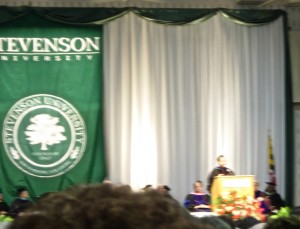 “I have to say, the exams I had to pass to earn an honorary degree aren’t nearly as tough as the ones you guys had to pass. I did have to write a 15 million page thesis, though. But luckily, other people wrote it for me,” jived Jimmy Wales yesterday as he took the podium in the gymnasium of Stevenson University in Baltimore, Maryland.
“I have to say, the exams I had to pass to earn an honorary degree aren’t nearly as tough as the ones you guys had to pass. I did have to write a 15 million page thesis, though. But luckily, other people wrote it for me,” jived Jimmy Wales yesterday as he took the podium in the gymnasium of Stevenson University in Baltimore, Maryland.
As keynote speaker in the 57th graduation ceremony for the small, liberal arts school, we expected Wales to lay some experiential wisdom on us, offer a metaphorical pat on the back, and leave us with inspirational insight as we embark on the harsh realities and unprecedented opportunities of the real world. You know, the typical graduation stuff.
“Luckily, the president just gave you that stuff. I’m a lot less fancy,” said Wales, as he adjusted the freshly bestowed hood and medal signifying his honorary doctorate degree from Stevenson. Less fancy? Yes. But inspirational, practical, relevant and entertaining? Definitely! The crowd loved him. And as a group of graduates in which many admit to be graduating only because of Wikipedia, we were compelled by his advice.
Listening to the stories of his numerous missteps, a few accidental successes, and a passionate, entrepreneurial spirit, I was comforted and inspired by what Wales has proven – the notion that one good idea that brings people together, built on social interaction and interdependence, can grow, and it can change the world. But also that failing is part of the process, and not every idea will make it big. Even Wikipedia guy has had some blunders.
Here’s what I learned about being successful from Jimmy Wales, the guy who changed how we see, use and interact with the Internet, and how we learn:
The BIG ideas don’t always work. He had three brilliant ideas. They all flopped. His first attempt at social revolution was trying to start an online food ordering system. The Internet service would connect downtown lunchers with area restaurants, and prevent the need for leaving the office during the lunch hour. It failed. Wales said restaurant owners looked at him like he was from Mars when he talked to them about the Internet in 1996.
Next, he started a search engine called Three Apes – “How could that not be a success?” he joked with us. It failed. Chinese hackers had spammed it and completely taken over within three months. Then he really got his stuff together and launched an online encyclopedia that was to be written entirely by experts. It was completely organized and serious business; writers had to fax in their PhDs to prove they were credible, said Wales. Nupedia, the free encyclopedia that cost him $250,000, yeah, this one failed too.
“Then I had a really dumb idea,” confessed Wales, for a free encyclopedia written by anyone who wants to contribute. Guess which idea stuck. Wikipedia is now one of the 10 most popular Web sites in the world.
Persistence and hard work are certainly the keys to success, but sometimes that spark, that great idea, is a complete accident. As one of the professors I was less than fond of in college always told us: trust the process. I wouldn’t take her class again, but her advice will stick with me. And this is exactly what Wales did with Wikipedia. He said he didn’t even really care if it was a huge success; he just felt the passion and need to complete this project. And the rest, as they say, is history.
It’s not always the complex, multi-faceted, expensive, BIG ideas that make a success. Sometimes it’s the little things. Sometimes it’s the “dumb ideas” that make it big.












I see that Wales also taught you how to execute the “Big Lie”, taking credit for doing something that someone else actually did.
Do you know who actually brought the idea of the wiki software and architecture to the Nupedia (check your spelling, Graduate) encyclopedia? Dr. Larry Sanger.
Do you know who actually named the new feeder project “Wikipedia”? Dr. Larry Sanger.
Do you know who issued the first invitation for people to come help build Wikipedia? Dr. Larry Sanger.
Do you know who spent most of the time in Wikipedia’s first year, ironing out the kinks and laying down the key guidelines and policies that still govern Wikipedia today? Dr. Larry Sanger.
Do you know about the only person in the world who thinks that “Honorary Dr.” Jimmy Wales was “the founder” of Wikipedia? Apparently, it’s you, and (of course) the liar Jimmy Wales.
Here’s a “dumb idea” for you — don’t tolerate people who take full credit for the hard work of others.